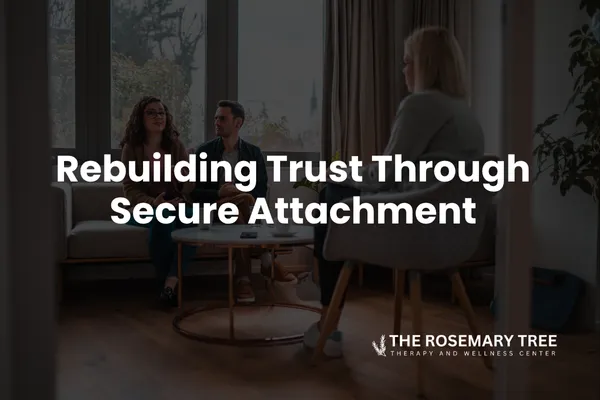
Rebuilding Trust Through Secure Attachment
Why Trust Feels So Fragile After Betrayal
Once trust is broken, it can feel impossible to rebuild. The betrayed partner questions every word or action. The partner who caused the harm feels desperate to prove change but frustrated that nothing seems enough.
The truth is, rebuilding trust is not about promises or apologies. It is about consistency.
Consistency creates safety, and safety is the foundation of secure attachment, the kind of bond that helps couples heal, even after deep pain.
What Secure Attachment Looks Like
Secure attachment does not mean perfect communication or constant harmony. It means both partners know that even in conflict, they are still connected and safe.
In a securely attached relationship, you can:
Speak honestly without fear of punishment
Depend on each other without feeling needy
Disagree without emotional collapse
Offer reassurance instead of withdrawal
This kind of stability is built over time through repeated experiences of reliability and care.
How Betrayal Disrupts Security
Betrayal breaks not only emotional trust but also nervous system trust. The betrayed partner’s body begins to anticipate pain again, while the other partner may become defensive or emotionally withdrawn.
The relationship starts to operate in survival mode. One person reaches out anxiously for reassurance, while the other backs away to avoid shame or confrontation. This cycle keeps both stuck in fear.
Attachment work helps couples slow down, recognize these patterns, and replace them with new, secure behaviors that restore calm.
Steps Toward Rebuilding Secure Attachment
Be Predictable
Small, reliable actions matter most — following through on promises, showing up on time, or keeping daily check-ins consistent. Predictability rebuilds safety in the nervous system.Listen to Understand, Not Defend
Instead of focusing on explaining, focus on understanding. Listening without defensiveness tells your partner their feelings are valid and important.Repair Quickly When Things Go Wrong
Every relationship has ruptures. What matters is repair. A calm apology or short moment of connection after conflict helps rebuild trust faster than avoidance.Offer Reassurance Freely
When your partner is triggered, reassurance is not weakness, it is medicine. Saying “I’m here,” “You’re safe,” or “We can talk about this” brings the body back to calm.Be Transparent
Hiding information, even small things, keeps the nervous system on alert. Radical honesty about time, feelings, and intentions rebuilds the sense of safety betrayal took away.
Why Weekly Therapy Isn’t Always Enough
Rebuilding trust through attachment work takes time and emotional presence. In traditional weekly therapy, just as one person starts to open up, time runs out. This can leave both feeling unfinished and tense.
Our Accelerated Deep-Work Therapy Intensives give couples the focused time they need to rebuild security.
During these intensives, couples can:
Learn how attachment and trust interact
Identify and break reactive patterns
Practice calm, structured communication with therapist support
Rebuild emotional safety through guided exercises
Create a roadmap for consistency and connection at home
These experiences allow couples to rebuild trust in real time, not just talk about it.
The Role of Accountability
For the partner who broke trust, accountability is the bridge to healing. It means showing reliability through consistent action, not perfection. It also means being willing to face your partner’s pain without rushing it away.
Accountability sounds like:
“I understand that you’re still hurting.”
“You don’t have to trust me yet, I’ll keep showing up.”
“I’m working to make sure this doesn’t happen again.”
Each moment of accountability rebuilds secure attachment piece by piece.
When You’re Afraid to Trust Again
For the betrayed partner, trusting again can feel terrifying. You may fear being blindsided again or feel foolish for hoping. This fear makes sense. Trust after betrayal is not blind, it is brave.
You do not have to trust all at once. Begin by trusting what is in front of you, consistent actions, emotional honesty, and the small ways your partner shows care. Over time, your nervous system begins to believe what your heart hopes for: that safety can return.
Final Thoughts
Trust is not rebuilt by time alone, but by presence, patience, and care. Every small act of consistency becomes a building block of safety.
If you are ready to begin rebuilding trust through secure attachment, we would love to help. You can reach out to us here, and our team will connect with you to talk about what this process could look like. There is no pressure, only space to begin again with guidance and compassion.


